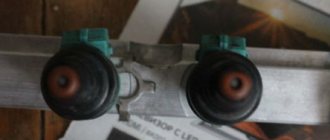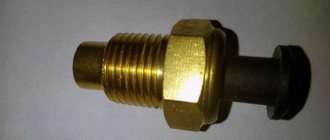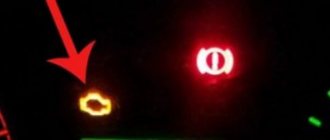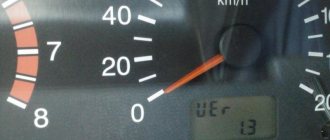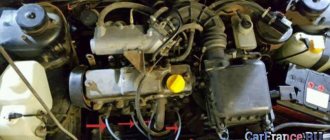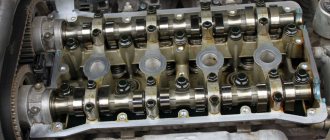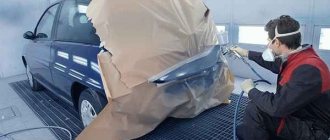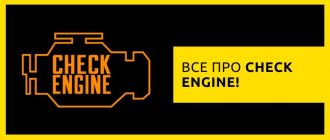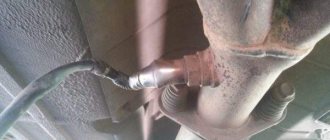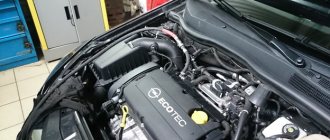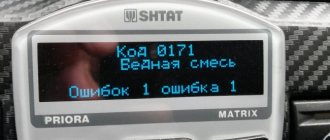Error Code P0171 occurs when the mixture is too lean, when there is not enough fuel and too much air. This mixture occurs when the engine is taking in too much air from the environment and/or the fuel system is not injecting enough fuel. This state of the mixture entails misfires, delays in the car's response to the accelerator, jerking during acceleration, idle failures, and unstable engine operation. In engine management systems Euro 2 and higher, the lambda probe controls the quality of the mixture in which there should be 14.7 parts of air per part of fuel. When the permissible range for increased air presence is exceeded, which is 20-30% of the norm, error P0171 appears.
Mixture indicator standards and possible consequences
For cars with the Euro-2 standard and higher, a special sensor was installed on the engines - a lambda probe. He controls the quality of the mixture produced. According to the standard, it is established that for one part of fuel there are 14 parts of air. If there is a minimum deviation of 0.25, the on-board computer will generate an error about a lean mixture. When an over-lean mixture enters the engine, not only failures in operation occur, but also the possibility of engine overheating. The rev speed is quite low. In addition, if you do not carry out high-quality diagnostics and do not eliminate the cause of the formation of a lean mixture, the consequences will become much worse:
- overheating of the power unit;
- burnout of piston rings;
- valve burnout;
- low engine thrust;
- burnout of pistons;
- increased fuel and coolant consumption.
What to do if there is an error
The causes of a lean mixture on the injector (including VAZ 2110), if detected, can be eliminated independently, but the best solution would be to take the vehicle to a specialized workshop, where auto mechanics will carry out high-quality diagnostics and will be able to detect other malfunctions in the operation of the vehicle. It is also worth contacting a service station because most drivers simply do not know how to control and adjust the composition of the air-fuel mixture being created. As a rule, on injection engines and carburetor engines, the car owner has this opportunity. An example is adjusting the throttle opening angle. To do this, it is enough to change the position of the locking ring, alternately moving it along the special grooves of the damper.
Self-adjustment
Most drivers are very glad that they know how to adjust the throttle angle, as they are completely confident that this will help regulate fuel consumption. In addition, some resort to flashing the vehicle's electronic control unit. In order not to damage some units or ECUs, it is worth seeking help from qualified technicians who can, using special programs, without affecting the quality of the mixture, improve some of the car’s performance. Otherwise, the risk of “killing” the engine of your vehicle increases. Thus, a lean mixture is formed on the injector, the reasons (2114 is no exception) for which lie in the independent adjustment of the angles or the intervention of an inexperienced car owner in the operation of the engine system.
Fuel system malfunction
Other causes of a lean mixture on the injector are due to improper operation of the vehicle's fuel system. As a rule, operational disruptions occur due to low-quality fuel, which is filled at little-known gas stations. One of the options for unstable engine operation and the formation of a lean mixture is clogged fuel cells of the car. In such cases, there is a misfire in the engine. As a result, the car may jerk. To prevent this from happening, it is necessary to purchase fuel only from trusted gas stations. Both fuel elements should also be replaced in a timely manner. Remember that one filter is presented on the injector in the form of a mesh and is installed directly into the fuel pump. The second element is most often located near the tank on the bottom of the car, less often in the engine compartment. To avoid over-leaning the mixture, it is necessary to change them at least once every 40,000 km. Sometimes this figure may be lower, since it all depends on the quality of gasoline.
Causes
Because it happens. It turns out that the reasons for poor fuel assembly are quite simple; they need to be looked for in the operation of the car itself. They can be determined using tests. And first of all, the elements that generate sparks are analyzed - candles. If any of them fails, the appearance of a faulty fuel assembly is, of course, a priori.
Injection system
Errors occurring in the injection system are said to be the main cause of mixture tilt. As you know, the injectors are “controlled” here, injecting fuel into the engine and controlling the preparation of fuel groups. Over time, the injectors tend to become clogged and therefore require flushing.
Incorrect injector operation is always a problem, and one of them is creating a lean mixture. Fuel is injected, but in very small quantities, as one or more injectors are clogged or clogged.
One of the reasons for clogged injectors is premature filter replacement. They allow foreign particles and debris to pass through, which settles in the nozzle holes.
It is also important to monitor the condition of the fuel tank. Over time, a lot of deposits also settle inside, and the incoming fuel gradually begins to become dirtier, which clogs the filters and injectors.
In addition to the injectors, the injection system also includes various sensors that control the opening angle of the air valve. Regulators that report incorrect information must be replaced.
The most common causes of a lean mixture include a malfunctioning fuel system. This usually happens due to:
- consumption of low-quality gasoline at Russian gas stations;
- clogging of car fuel cells.
Filters and airing
The latter mainly concerns fuel filters. As you know, on modern cars there are two of them: a large mesh and FTO (fine mesh). Both filters are extremely important; clogging one of them leads to difficulties in the operation of the entire machine. Therefore, it is so important to change filters in a timely manner and monitor their condition. The coarse mesh is located inside the submersible injection pump, and the FTO is installed separately, usually under the threshold of the car.
It is also possible that ventilation has occurred in the injector system. Air is sucked in from the fuel pipes or other places, which ultimately causes the percentage to increase. A certain amount of air gets into the mixture, depleting it. That’s why it’s so important to monitor tightness.
On some vehicles, the intake manifold can break down over time. If it is not replaced, air will begin to penetrate in large quantities. Another common occurrence for aspiration is the XX sensor. It must be replaced along with the torn o-ring.
Clogged injectors
If you do not change the fuel elements of the car system on time, a lean mixture may form on the injector, the reasons for which will lie in the incorrect operation of the injectors. That is, fuel is supplied, but supplied in fairly low quantities. An injector is a special device related to the injection system of a car. There are many elements: electromagnetic, electrohydraulic or piezohydraulic. Vehicles with gasoline engines use electromagnetic parts.
To solve the problem, you can restore the previous injection by washing the injectors, which is carried out only using special equipment.
By the way, to avoid contamination of fuel filters and injectors, you should clean the fuel tank at regular intervals, since there is a large accumulation of dirt, sand or other substances there.
Lean mixture error P0171
Error code P0171 occurs when the mixture is too lean, when there is not enough fuel and too much air. This mixture occurs when the engine is taking in too much air from the environment and/or the fuel system is not injecting enough fuel.
This state of the mixture entails misfires, delays in the car's response to the accelerator, jerking during acceleration, idle failures, and unstable engine operation. In engine management systems Euro 2 and higher, the lambda probe controls the quality of the mixture in which there should be 14.7 parts of air per part of fuel. When the permissible range for the increased presence of air, which is 20-30% of the norm, is exceeded, error P0171 .
Symptoms of a lean fuel assembly
ATTENTION! I found a completely simple way to reduce fuel consumption! You do not believe me? Even a mechanic with 15 years of experience didn’t believe it until he tried it. Now save 35,000 rubles a year on gasoline! Know more"
A fuel mixture or group is a certain amount of gasoline and air. A lean mixture means there is less fuel in the fuel block than needed. There is also an enriched mixture, when there is much more fuel.
The presence of a low-quality fuel assembly can be determined by its characteristics:
- occurrence of misfires;
- delay in engine response during acceleration and sudden pressing of the accelerator pedal;
- engine interference;
- automatic shutdown of the internal combustion engine at idle;
- twitching when maneuvering or accelerating;
- change the engine sound when starting;
- unstable operation of the engine as a whole.
As you can see, the presence of a spent fuel group can only be determined by signs of engine operation.
How does a car behave on a lean mixture?
When operating on a lean mixture, the car engine idles unevenly, overheats due to the lower combustion rate of such a mixture, and popping noises are heard in the intake pipe. The car itself can slow down and slowly gain momentum under load.
During long-term operation with a lean mixture, excessive fuel consumption occurs due to a slow increase in speed, as a result of which you have to operate the car in low gears. A lean mixture appears as a result of an imbalance in the supply of air and fuel for mixing with a large amount of air.
Why does P0171 appear?
The reasons for too much air getting in are:
- Dirt in the air flow sensor, as a result of which it cannot correctly take into account air flow;
- Vacuum leak;
- The EGR valve, which is responsible for exhaust gas recirculation, does not close tightly enough and allows air into the intake manifold;
- High air flow through the EGR valve due to a faulty EGR differential pressure sensor.
If the cause of a lean mixture is a lack of fuel, then the following malfunctions:
- Insufficiently powerful fuel pump;
- Fuel filter with resistance;
- Dirty fuel injectors;
- Leak in the fuel pressure regulator. To find the cause of the P0171 error, you need to outline the reasons why a lean mixture enters the engine and the check engine shows such an error. After this, a sequential plan for checking the car is drawn up:
- Injectors and fuel supply system;
- Tightness of intake and exhaust manifolds and accompanying hoses;
- Air and oxygen flow sensors (mass air flow sensor and lambda probe).
Error P0171 - what it means, symptoms, causes, diagnosis, solution
This article will tell you everything you need to know about the P0171 code. You will also learn how to diagnose and fix the error yourself in the easiest and fastest way.
There is a lot of misinformation about the P0171 code and a lot of dubious advice on how to fix it. In this article, we will tell you how to properly diagnose this error code in order to find solutions as quickly as possible.
How is the check carried out?
Check sensors . One of the most common causes of the P0171 code is a clogged air flow sensor (MAF). The sensor's response to changes in air flow may be slow due to dirt accumulated on its wire. It can also be contaminated by fuel vapors that escape through the intake manifold and throttle body when the engine is not running. These vapors deposit a waxy layer on the sensor wire, which causes a signal to be sent indicating that there is not enough air in the mixture. And the engine control unit, in turn, does not add fuel when the amount of air increases and the overall balance of the mixture is disrupted. All this leads to a lean fuel mixture and the appearance of error P0171. Often, along with this error, errors p0100 or p0102 may appear, which clearly mean a malfunction of the mass air flow sensor. To solve the problem, the sensor itself must either be cleaned using a special cleaner for electrical appliances or carb cleaner (spraying onto the sensitive element), or a new one must be installed.
Lean mixture at idle and under load: carburetor, injector
To determine the possible causes of a lean mixture, let's start with a simpler carburetor internal combustion engine. On such motors, the problem is most often localized in the power system. The list of common faults includes:
- the carburetor prepares a mixture whose composition does not correspond to the operating mode of the engine;
- there is an insufficient supply of fuel from the fuel tank; there is a low fuel level in the carburetor float chamber;
- fuel does not reach the carburetor in full, that is, a leak has occurred;
It turns out that incorrect settings of the dosing system (carburetor) can lead to a lean combustible mixture. For example, if the fuel level in the float chamber is set to low. Also, one should not exclude the possibility of clogging of fuel jets, individual violations during their adjustment, etc.
It is also possible that the shut-off needle in the carburetor float chamber is in the closed position. At the same time, it is necessary to check the fuel lines and fuel filters, the tightness of the gas tank, the operation of the air valve in the tank cap, and the fuel pump.
As for the air supply, third-party suction is most often noted in those places where the carburetor is connected to the intake manifold, as well as in the area where the intake manifold is connected to the internal combustion engine, etc. Excess air can be sucked in as a result of loose fasteners, destruction of sealing gaskets, cracking of structural elements and other defects.
Lean mixture on the injector: “check”, lean mixture
The fuel injection system is more complex than a carburetor, as it includes a large number of electronic sensors. Failure of individual devices or depletion of the mixture for other reasons leads to the fact that in some cases a “check” lights up on the instrument panel.
For example, air may be sucked in at the place where the idle speed sensor is installed. One of the simplest reasons may be a cracked or damaged rubber gasket ring, which seals and seals the connection.
Let us add that problems with mixture formation and leanness on many engines are detected by the system as error p0171, lean mixture. In this case, it is necessary to conduct computer diagnostics of the engine. If a “lean mixture” engine error occurs, then you should check the intake system, power system, ECM, as well as individual elements in the exhaust system.
In the list of the most common problems, experts highlight:
- contamination of injection nozzles;
- intake air leak;
- oxygen sensor (lambda probe);
- mass air flow sensor (MAF);
Constant malfunctions of the internal combustion engine due to mixture formation are usually caused by a dirty air flow sensor. This sensor simply loses the ability to correctly calculate the amount of air consumed. Also note a possible vacuum leak.
Another cause could be the EGR valve. The specified valve of the exhaust gas recirculation system becomes very dirty during operation and ceases to close tightly, as a result of which excess air is sucked into the intake through the slightly open valve. Increased air flow through the EGR valve can also be caused by a failure of the pressure difference sensor in the recirculation system.
As for the power system, the mixture becomes leaner:
- decreased fuel pump performance;
- contamination of fuel filters and fuel supply lines;
- decreased performance and contamination of injection nozzles;
- leaks through the fuel pressure regulator in the fuel rail;
In the exhaust system, special attention should also be paid to the lambda probe and catalyst. Quite often, it is the lambda that shows a lean mixture, when scanning, the error “lean catalyst mixture” is recorded, the diagnostics determines an incorrectly functioning oxygen sensor, a lean mixture is formed due to malfunctions of the oxygen sensor and a failed/burnt-out catalytic converter.
Checking and eliminating causes
General diagnostics begins with the ECM sensors. Typically, the P0171 code occurs due to a malfunction of the MAF sensor (mass air flow sensor). The fact is that the specified sensor ceases to respond in a timely manner to changes that relate to air flow. The cause is usually an accumulation of contaminants.
Contamination of the MAF sensor can occur due to the ingress of fuel vapors that penetrate through the intake and throttle assembly at times when the engine is not running. As a result, a layer of paraffin forms on the sensor, as well as on its wiring, which causes the sensor to send an incorrect signal to the ECU about the lack of air to prepare the mixture.
In this case, the control unit automatically reduces the fuel supply so that the amount of air increases. The result is a lean mixture at different operating modes of the power plant. After this, error P0171 occurs; in parallel, error P0100 or P0102 can be detected. Such codes usually indicate problems and malfunctions in the mass air flow sensor.
To eliminate the causes, the sensor must be removed, after which it is cleaned. You can use carburetor cleaner as a cleaner. The device must be cleaned carefully so as not to damage the sensitive element. If cleaning does not help, then the sensor needs to be replaced.
If the mass air flow sensor is in working condition, then further checking is to determine possible depressurization and air leaks. Defects may occur in the inlet pipe area, in the throttle body area.
- It is necessary to separately check all vacuum hose connections, intake manifold mounting location, throttle body gasket, intake manifold gaskets, etc.
- Also, cracking or other damage to the crankcase ventilation system pipes, fuel vapor recovery system hoses, and plugs on the intake manifold is not allowed.
- The exhaust system must be completely sealed (without corrugations, etc.), since defects near the installation site of the oxygen sensor will also lead to mixture formation failures.
As for the EGR system differential pressure sensor, if present, this sensor can also cause the P0171 code to appear if it fails or malfunctions. The specified sensor is located on the engine, connected to the main pipe for supplying exhaust gases to the USR using two separate pipes. The sensor controls the exhaust recirculation valve.
Contamination of the differential pressure sensor affects its sensitivity, causing the sensor to signal that not enough exhaust gas is entering the system, thereby forcing the EGR valve to open for a long time. This discovery leads to more air in the mixture and depletion occurs.
Now let's move on to checking the fuel system, since reducing the volume of fuel supplied in some cases does not allow the mixture to be enriched, leaving it lean. Fuel supply diagnostics involves the following steps:
- First of all, you should make sure that the fuel filters allow the fuel to flow in the proper volume.
- Then you will need to measure the fuel pressure in the fuel rail, and also make sure that the pressure regulator is working.
- At the same time, you may need to check the fuel pump and its performance.
- Another operation will be diagnosing the injectors (preferably on a bench), as well as cleaning them if necessary.
Having a professional car scanner or a compact device that connects to the OBD II diagnostic connector allows you to evaluate a number of parameters without disassembling the engine and removing equipment. If error P0171 appears with some frequency, then the cause may be an unreliable connection or damaged electrical contacts. In this case, the wiring of the sensors, wiring harnesses to the controller, and ground are checked.
Injector problems
You don't have to be an expert to understand that the problem here lies in the operation of the injector. And first of all, before we start studying lean mixture, let’s try to find out what it even is. This is important only because such a reason can lead to expensive repairs to the car.
Why do jerks happen?
The presence of jerks while the car is moving is a problem that directly or indirectly indicates the presence of problems with the engine, or more precisely, a loss of power. In total, there are two features that affect the development of power in the engine - fuel supply and the ignition system.
If with the ignition, everything is more or less clear, due to the inspection of the generator, spark plugs, ignition wires for faults, and the battery for charge, then in the case of the ignition system everything looks much more complicated.
High voltage wires are marked with arrows
Inspecting the condition of the spark plugs
To ensure a successful engine start, it is necessary to mix the fuel and air mixture in ideal proportions; this is what the injector is responsible for.
It happens that when mixing these proportions, a malfunction occurs, and the mixture turns out to be rich or lean.
A clear example of the air-fuel mixture ratio.
In order for the car to obtain maximum power when burning fuel in the cylinders, it is necessary to bring its indicator to the level of 0.85 - 0.9, when excess oxygen = > 1 (at this indicator, gasoline burns completely without residue - approx.), and when there is a lack of oxygen, and the readings are equal. The main reasons for a lean mixture
The main and most important symptom that the system has a lean mixture is a stalling or unstable engine. And if the mixture is very poor, then it is possible that it will not start at all.
The cause of these problems is most often a clogged air filter (see “replacing the air filter”), clogged injectors, wear in the fuel pump, and there may also be air leaks into the system. All these reasons are, one way or another, related to the stable operation of the engine.
What to do
If an error is detected, it can be eliminated manually or by contacting specialists. Why this needs to be done is described in detail above. Of course, it would be better to take the car to a service station, where experienced technicians will check other breakdowns, check and adjust all elements of the automotive system in accordance with the standards.
Self-adjustment
Experienced motorists themselves know how to adjust the throttle position angle. With the help of proper settings, it will be possible to regulate fuel consumption and normalize the mixing of fuel groups.
Thus, self-regulation of the injector in case of problems with the fuel mixture comes down to the following steps.
- Check the connectors for dirt deposits.
- Inspect the supply pipes for air leaks.
- Check the operation of the nozzles, wash them if the procedure has not been carried out for a long time.
- Pay attention to the sparkling elements. If one of the candles is too lit, this is a clear sign of excess air.
- Check the ignition coils.
- Check the drain, which can easily indicate the presence of a lean mixture. Consequently, when lean, the muffler tends to make an automatic popping sound.
- Check the operation of the fuel pump, which fails over time. It also happens that it works reluctantly and still needs to be changed.
And finally. Remember that if the injector has mechanical injection, the cause may also be hidden in the RTD. This is a sensor installed on the fuel rail to monitor and control the amount of fuel.
If you take care of your car, carry out timely maintenance, and install original spare parts, problems can be minimized.
Forget about camera fines! An absolutely legal new product - Jammer for traffic police cameras, hides your license plates from cameras that are found in all cities. More details at the link.
- Completely legal (Article 12.2);
- Hides from photo and video recording;
- Suitable for all cars;
- Works through the cigarette lighter socket;
- It does not interfere with radios or cell phones.
List of reasons for poor mixture at the injector. What to check and how to do it?
The reasons, among other things, are not so varied and are often quite easy to eliminate. The main thing is to understand what is going on with your car and take action before it gets offended and completely refuses to drive, and your nerves begin to subside.
The reasons for a lean mixture at the injector, as mentioned above, are quite trivial. Anyone who has a fuel injected engine in their car knows that it can regulate the ratio of gasoline vapor to air. However, not everyone thinks about their fair balance. For people who are not inclined to go into technical details, we explain: the norm is considered to be the proportion of one kilogram of the same vapor per 15 kilograms of air.
At the same time, parity between fuel economy and engine power is maintained. If the weight of air is reduced to 13 kg, then gasoline will correspondingly increase, the engine will receive more power, but fuel consumption will also increase significantly.
In the opposite situation (often admitted with full knowledge of what you are doing), when you introduce 16 kg of air, power is reduced by 10 percent compared to a rich mixture, but savings increase by 15-20%. However, further dilution of gasoline leads not only to a decrease in engine thrust, but also to an increase in fuel consumption: when trying to climb a mountain, you press the gas, burn more fuel, and the efficiency is zero.
Therefore, no one installs an injector of up to 20 kilograms of air per 1 gasoline. That is, there are some disagreements with the node itself.
The primary and main symptom of a lean mixture is a stalled engine. A very weak mixture means that the engine does not start at all, and if it does, then when you try to move, it immediately turns off. It’s just that the mixture is not rich enough and the car jumps and jerks when driving. However, this style of movement is not limited to the slender mixture.
The car can behave like this and have problems with any part of the ignition: coils, spark plugs, distributor cap, wires, carbon or slider. Therefore, it is necessary to pay attention to other signs, indirect or less obvious. Experienced drivers recommend the following.
Unscrew the spark plugs and look at their color. If they are light brown, the injector is working properly; dark - not enough air; light is its excess. However, carbon deposits cannot serve as an accurate indicator: its shade does not correspond to the norm both when the ignition is set incorrectly and when there are errors in the selection of the spark plugs themselves. More details in the article "".
… If the mixture is lean, the muffler produces an automatic explosion without much recoil, and if the mixture is too rich, isolated, noticeable explosions occur.
Separately, symptoms may indicate various malfunctions; in general, they may indicate malfunctions in the injector. Ideally, of course, it would be worth getting a gas analyzer, but few people have one lying around on a shelf in the garage.
There are only 3 of them and we will look at each in detail.
- The most common type is dirt. It clogs injectors and filters, so that the fuel supply to the engine is not complete;
... Either a crack has formed on one of the pipes and nozzles connected to the manifold, or the pressure in it has been depressurized, or some connections are not tightened well;
- The fuel pump died silently. Or he is still alive, but works for a quarter of his own, that is, he will still have to change.
Causes of excess air
If, after carrying out this work, instability is also observed in the operation of the system, pay attention to possible places where excess air occurs, since it also affects the leanness of the mixture and the main reasons lie in the following:
- Presence of dirt or marks on the mass air flow sensor.
And in order to eliminate the above reasons, it is necessary to conduct a thorough diagnosis.
Troubleshooting
Mass air flow sensor - the air flow sensor can become clogged due to natural reasons, as well as from vapors that come from the throttle valve while the car is not running. And then, over time, accumulating in a thick layer on the thin thread of the sensor, forcing it to send inaccurate data to the ECU, which in turn negatively affects the parameters of air flow and flow into the system.
When diagnosing its malfunction, it is best not to rush into purchasing, since it costs a lot of money, but it is best to check its performance on a known working device. And when it is established that the reason lies in it, then you can try to clean it, or then replace it with a new one.
Vacuum leak
Vacuum leak - these words mean any form of air leaks, i.e. suction into the system, primarily through the manifold gasket or hoses.
The vacuum pump and return hose may cause
Pay attention to the condition of the pipe leading from the air filter to the throttle valve, and the hoses that go to the crankcase ventilation. There should be no visible damage to them, as well as large cracks through which excess air could enter.
In addition to all of the above, you can check the engine oil dipstick and the oil filler cap on the neck, because if these connections are not completely closed, they can cause the appearance of that same excess air.
Air leak
All we need is just the key for “10”. You need to unscrew the mass air flow sensor from the air filter and pull it out together into the corrugation.
Now we start the engine and, using the palm of our hand, completely block the air inlet into the intake manifold through the mass air flow sensor. The corrugation should shrink from the vacuum and after a couple of seconds the engine will stall. We don’t let go of our hand and listen for where things hiss—this is an extra air leak (more details in the video below).
Second way. Here we need some kind of flammable liquid - gasoline, ether, WD-40, carburetor cleaning fluid, etc.
It is best, of course, to use gasoline or ether, they are more natural for engine operation. We fill a syringe with gasoline or take a can of any of the above liquids and spray all the connections of the intake manifold. If any of the connections are not sealed, then the liquid will definitely get inside the manifold and the engine speed, at the same time, should change (either decrease or increase).
If the engine does not react in any way, then the connection is sealed, there are no problems with it and you need to look further. Well, if the engine starts to react, consider half the job done. We change the gasket or hose and rejoice that error P0171 has disappeared.
The third method is to use a smoke generator. If you don’t have such a thing in your garage, you can ask your friends for it or make it yourself. There are many options for making smoke generators on the Internet. I chose the simplest and fastest - a smoke generator made from a regular cigarette.
